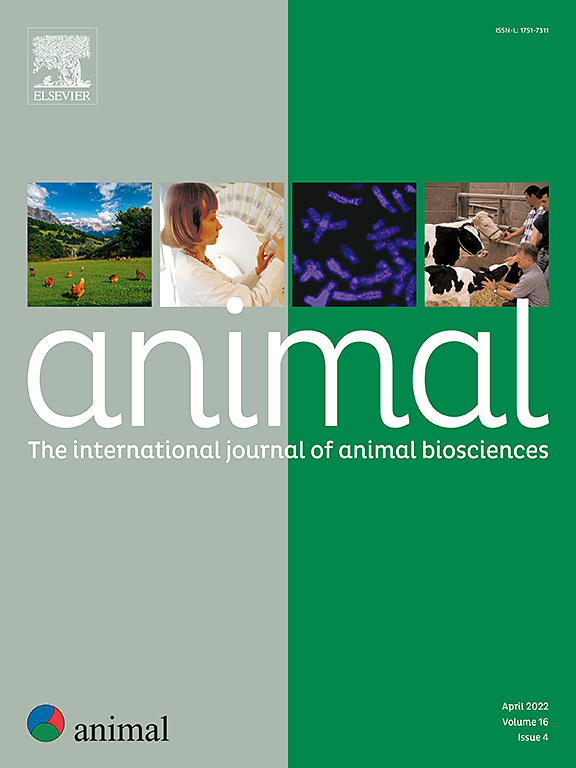Effect of fish oil in Iberian sow diets on fatty acid, oxylipins and immune traits of colostrum and milk, and suckling piglets’ growth performance
IF 4
2区 农林科学
Q1 AGRICULTURE, DAIRY & ANIMAL SCIENCE
引用次数: 0
Abstract
Iberian sow productivity is characterised by a low number of weaned piglets with higher within-litter variation in piglet birth BW compared with conventional breeds. To overcome this, nutritional strategies, such as the dietary addition of n-3 fatty acids (FAs), are being studied to improve sow performance, as well as colostrum and milk composition. In addition, n-3 FAs and their derived oxylipins could also be beneficial for the offspring due to their anti-inflammatory roles. The present study was conducted in an outdoor production system where sows were group-fed during the mating and gestation periods, while feed intake was provided individually during lactation. The study aimed to evaluate the effects of including fish oil rich in eicosapentaenoic and docosahexaenoic acids (EPA and DHA, respectively) in Iberian sow diets on litter size, piglet growth during lactation, and the concentrations of anti-inflammatory molecules in colostrum and milk. Forty sows were randomly assigned to either a control or fish oil diet during pregnancy and lactation. Sow performance and litter traits were monitored until weaning. Colostrum and milk were collected after the birth of the first piglet and at weaning, respectively. Their FA composition, oxylipin profile, and immune indicators were analysed. Despite the piglets from the control group having greater average birth BW than those from the fish oil litters (P = 0.016), the fish oil piglets were heavier at weaning (P < 0.028). Total n-3 FA concentration was increased in the colostrum and milk of fish oil-fed sows (all P < 0.001), mainly due to increases in EPA and DHA concentrations (all P < 0.001). In the same way, most of their oxygenated derivatives were also increased in both colostrum and milk (P ≤ 0.045). The colostrum from fish oil-fed sows also presented higher concentrations of immunoglobulins (Ig) G and A than that from control sows (P = 0.025 and P = 0.026, respectively). In conclusion, the inclusion of fish oil in sow diets increased the levels of IgG and IgA in colostrum, n-3 FAs and their derived oxylipins in colostrum and milk, and piglet BW at weaning.
伊比利亚母猪日粮中添加鱼油对初乳和乳汁脂肪酸、氧脂类、免疫特性及哺乳仔猪生长性能的影响
伊比利亚母猪生产能力的特点是断奶仔猪数量少,与常规品种相比,仔猪出生体重的窝内变化较大。为了克服这一问题,人们正在研究营养策略,如在饲粮中添加n-3脂肪酸(FAs),以提高母猪的生产性能,以及初乳和乳成分。此外,n-3脂肪酸及其衍生的氧化脂素也可能因其抗炎作用而对后代有益。本研究是在室外生产系统中进行的,母猪在交配和妊娠期间是集体饲养的,而在哺乳期间是单独采食量的。本试验旨在评价在伊比利亚母猪日粮中添加富含二十碳五烯酸和二十二碳六烯酸(EPA和DHA)的鱼油对产仔数、泌乳仔猪生长以及初乳和乳中抗炎分子浓度的影响。在怀孕和哺乳期间,40头母猪被随机分配到对照组或鱼油组。监测母猪生产性能和产仔性状,直至断奶。初乳和乳汁分别在仔猪出生后和断奶时采集。分析了它们的FA组成、氧化脂谱和免疫指标。尽管对照组仔猪的平均出生体重高于鱼油组仔猪(P = 0.016),但鱼油组仔猪断奶时体重更重(P <;0.028)。鱼油饲喂母猪初乳和乳中总n- 3fa浓度升高(P <;0.001),主要是由于EPA和DHA浓度的增加(所有P <;0.001)。在初乳和乳中,其大部分含氧衍生物含量均显著升高(P≤0.045)。鱼油母猪初乳中免疫球蛋白G和免疫球蛋白A的含量也高于对照母猪(P = 0.025和P = 0.026)。由此可见,母猪饲粮中添加鱼油提高了初乳中IgG和IgA水平,提高了初乳和乳中n-3脂肪酸及其衍生氧脂类含量,提高了仔猪断奶体重。
本文章由计算机程序翻译,如有差异,请以英文原文为准。
求助全文
约1分钟内获得全文
求助全文
来源期刊

Animal
农林科学-奶制品与动物科学
CiteScore
7.50
自引率
2.80%
发文量
246
审稿时长
3 months
期刊介绍:
Editorial board
animal attracts the best research in animal biology and animal systems from across the spectrum of the agricultural, biomedical, and environmental sciences. It is the central element in an exciting collaboration between the British Society of Animal Science (BSAS), Institut National de la Recherche Agronomique (INRA) and the European Federation of Animal Science (EAAP) and represents a merging of three scientific journals: Animal Science; Animal Research; Reproduction, Nutrition, Development. animal publishes original cutting-edge research, ''hot'' topics and horizon-scanning reviews on animal-related aspects of the life sciences at the molecular, cellular, organ, whole animal and production system levels. The main subject areas include: breeding and genetics; nutrition; physiology and functional biology of systems; behaviour, health and welfare; farming systems, environmental impact and climate change; product quality, human health and well-being. Animal models and papers dealing with the integration of research between these topics and their impact on the environment and people are particularly welcome.
 求助内容:
求助内容: 应助结果提醒方式:
应助结果提醒方式:


